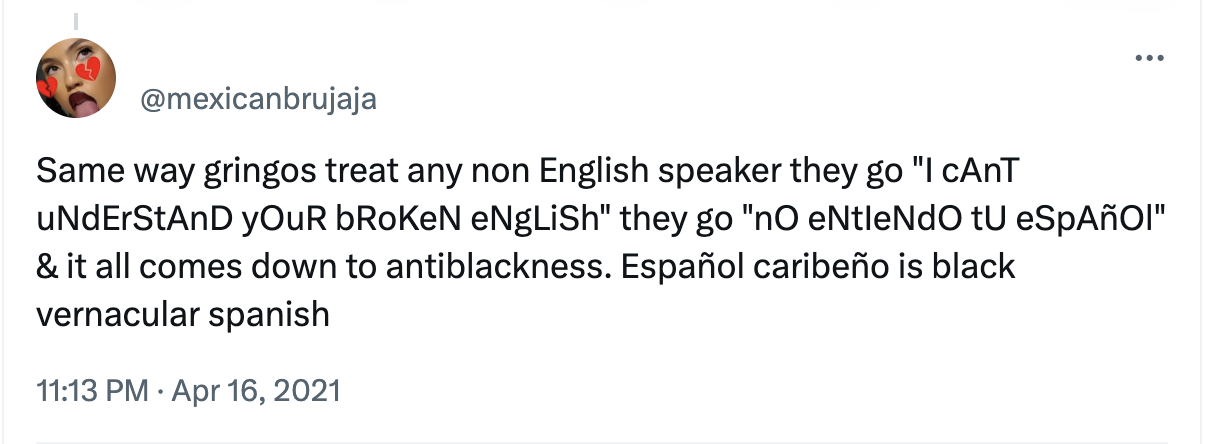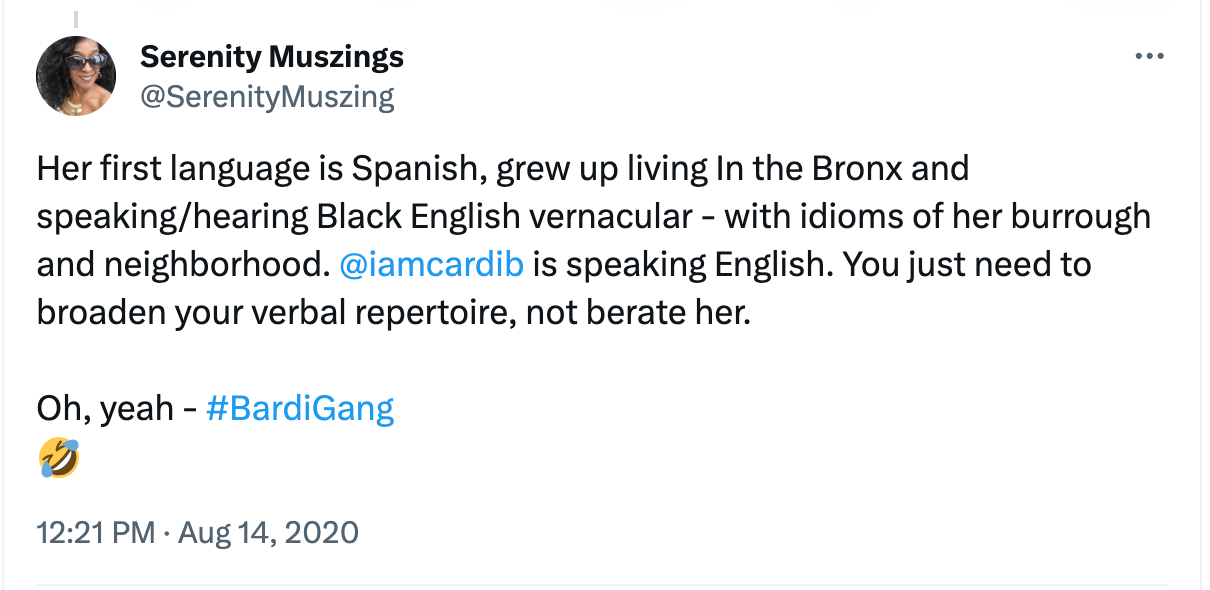Some people got a surprising result after taking an MIT dialect quiz. It was meant to guess what U.S. dialect the test taker spoke and the person's native language. As results started coming in, many Spanish speakers saw their English dialect had been marked as “U.S. Black Vernacular/Ebonics”:


But what's the connection between speaking Spanish and U.S. Black Vernacular?
Black language and reclaiming Black vernacular
In the United States, dialects spoken by African Americans are sometimes referred to as Black English, African American Vernacular English, or even Ebonics. Though the terms have had different levels of popularity, having a specific name at all has given African Americans the ability to reclaim their language practices as a joyous part of their identity.
But much less common are terms and discussions about Blackness and Black language beyond English. If Black English dialects exist, are there also Black forms of other languages due to colonization? For example, are there Black Spanishes and Black Portugueses, too?

Are there Black dialects of Spanish?
About 25% of Latin America's population is Afro-descendant—compared to 12% of the U.S. One way to talk about this Afro-heritage is to use Black as a racial term, so a Black Spanish dialect would be the language that developed among the large populations of Afro-descendants in Latin America.
So then does Black Spanish exist? What does it sound like, and who uses it? Where could we hear it?
There are two ways we can think about Black Spanish. Firstly, it could describe individuals or communities of Spanish speakers with African heritage. It doesn't necessarily refer to a separate language but rather the racial or ethnic background of these Spanish speakers. But this definition is missing something, since it doesn't capture how these communities use language. Many of these speakers' language practices—their pronunciations, vocabulary, and grammar—are considered "slang" or "street language." Their language is often considered improper, slang, or even youth language, much in the way that Black English was (and often still is) understood.

But there's a second way we can think of Black Spanish: It may also describe a language variety (or more likely, multiple language varieties) with complex influences and histories unique to the communities of Black Spanish speakers. It can mean the Spanish or Spanishes resulting from migration (mostly forced) from Africa to the Americas, and from Latin America to the U.S. With this meaning, Black Spanish gives us a way to talk about the ways that Afro-descended Spanish speakers have influenced and been influenced by other Afro-descended populations, such as African Americans in the U.S. and English-speaking Afro-Carribeans.
And this is exactly what we find: Black Spanish varieties represent the specific experiential, historical and cultural heritage of their speakers.
What does Black Spanish sound like?
There are as many Black Spanishes as there are Black Spanish communities!
For example, we hear Black Spanish in Dominican hair salons in Harlem, New York, where the Spanish has been influenced by English—including Black English:
- Rollos is used for "hair rollers"
- Permanente is used for the hair straightening process African Americans call perms (as opposed to the meaning popularized in the 80s for permanently curling your hair)
Much like Black English, Black Spanish is known for processes like the shortening of words: In the same way that What is up? becomes Wassup? in English, the Spanish phrase ¿Qué es lo que es? (What's up? / What's going on?) becomes ¿Qué lo que? (which can be written with the abbreviation KLK—even though the letter "k" is rarely used in Spanish!). There is also vocabulary with roots in African languages, including many words in Dominican Spanish:
- ñam and ñame, from Jamaican Creole for "eat"
- guineo (banana)
- mondongo (tripe stew)
- cachimbo (tobacco pipe)
- fucú (evil spirit)
One way of marginalizing people is to say that their language—or their dialect—doesn't exist, and this kind of erasure happens when a group of people is stigmatized in a society: Their language becomes stigmatized, too. Accents and words become tied to the groups or individuals who use them most, but we hold on to even the stigmatized aspects of our language, especially amongst close family and friends, because our language is a part of us!

Say Hey Prii to the Black Spanishes around you!
Recognizing Black Spanish as a rich and unique Spanish dialect centers the cultural practices and identities of millions of people. Learning about Spanish dialects gives us a deeper connection to all Spanish speakers, including the Afro-descendants who have shaped much of the cultural heritage of Latin America—and the forms and functions of Spanish itself!
(Hey Prii is a Black Colombian phrase used the way you might hear Whatsupp Cuz used by Black communities in California in the U.S.!)



